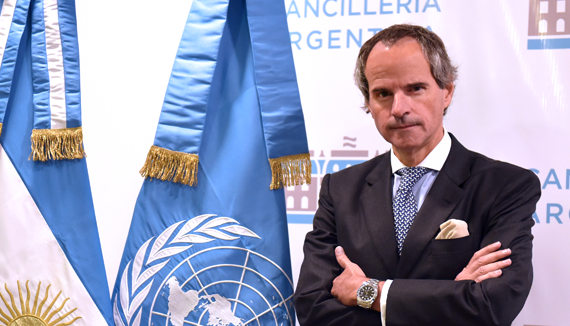December 9, 2019
Miles Pomper
The following is an excerpt from the World Politics Review
Rafael Grossi, a veteran Argentinian diplomat, took the helm of the International Atomic Energy Agency on Dec. 3, promising to bring renewed vigor and a higher profile to the world’s nuclear watchdog after the illness and death of his predecessor, Yukiya Amano of Japan.

Rafael Grossi, Source: WikiMedia Commons
Grossi, who has previously served as Argentina’s permanent representative to the IAEA and the agency’s effective chief of staff, most recently has been heading preparations for next year’s review conference of the Nuclear Nonproliferation Treaty. In a fall contest that stretched over several rounds, Grossi bested Romanian diplomat Cornel Feruta and two other competitors to win the support of the agency’s 35-country Board of Governors. Feruta, Amano’s former chief of staff, served as caretaker head of the agency after Amano died unexpectedly in July.
Grossi will now have to lead the UN body, which counts 171 member states and has a staff of more than 2,500 people, at a time when it is caught in a great-power crossfire over Iran and deepening rifts between the world’s leading nuclear powers: the United States and Russia.
In speaking to reporters Dec. 2, Grossi outlined an ambitious vision for the IAEA, pledging greater transparency and a higher public profile for the agency in global deliberations. “On some issues of global significance,” he noted, “the voice of the agency is rarely heard.”
[…]Grossi is likely to face an important early test when it comes to Iran. Since President Donald Trump withdrew the United States last year from the international agreement limiting Iran’s nuclear energy program, Tehran has been edging away from its commitments under the deal. It is selectively violating some of the agreement’s provisions in order to raise pressure on European countries to maintain their own commitments under the deal.
[…]Already, on his first day in office, Grossi warned Iran about intimidating agency inspectors over an incident in October, when an inspector had her accreditation revoked for apparently triggering a security check that is used to detect explosive devices at the Natanz enrichment plant. The inspector was temporarily prevented from leaving Iran, which the IAEA at the time called “unacceptable.” Yet some observers criticized Feruta’s otherwise restrained reaction. “I stand by my inspectors,” Grossi told the AFP last week. “They shouldn’t be intimidated… in any way.”
[…]A key milestone will come in March when Grossi will provide his first report to the IAEA’s Board of Governors on Iran’s fulfillment of its 1974 Safeguards Agreement with the IAEA, as part of the Nuclear Nonproliferation Treaty, and of the 2015 nuclear deal.
Aside from Iran, Grossi said that the IAEA plans to further ramp up its preparations for returning to North Korea, with inspectors ready to be deployed immediately should stalled nuclear talks between Pyongyang and Washington pick up again and lead to a breakthrough. Much of his focus, however, will be on streamlining the agency’s top-heavy management, including a pledge that women will make up half of its senior management, from roughly a third today. He also promised to seek new sources of funding, such as public-private partnerships, to boost IAEA’s technical cooperation programs, which help developing countries take advantage of nuclear technology in areas like agriculture and medicine, such as sterilizing insect to protect crops and radiation treatment for cancer.
Continue reading at World Politics Review
